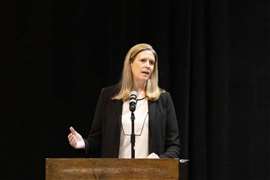SME definition debated in Europe
17 May 2018

The current definition of SMEs (small and medium-sized enterprises) is still fit for purpose and should not be widened, according to the European Builders Confederation (EBC), which was responding to a vote on the term by the Industry, Energy & Research Committee (ITRE) of the European Parliament.
The vote on the resolution of the definition of SMEs was initiated by German MEP Markus Pieper.
EBC said it welcomed the fact that the European Parliament was taking a pro-active approach on this issue, because the enterprises that were in real need of support and simple rules required special attention.
However, EBC said that in contrast to the ITRE committee, it believed the SME definition was still fit for purpose, and any extension regarding financial thresholds and owner-structure would be counter-productive.
Eugenio Quintieri, EBC secretary general, said, “The current definition covers those enterprises that experience the same market challenges as other market actors but have fewer capacities to deal with them.

“Instead of widening it up to include bigger enterprises, we should more strongly focus on the most vulnerable companies, namely micro and small enterprises that constitute the vast majority of the construction sector.”
EBC said it believed that the SME definition should always work to the benefit of SMEs and ease their access to public support.
It said the current SME definition already included 99.8% of all enterprises in the European Union, and it felt that a change, especially regarding financial thresholds, would only dilute further the distinction between the enterprises confronted with market failures and particular challenges as a result of their size and capacity, and those that only want to ease their burden without real need.
Within this frame, EBC said it did not consider it necessary to update the SME definition with regard to inflation and labour productivity forecasts, as suggested by the ITRE committee.
‘Distortions’
Furthermore, it said adapting the financial thresholds in line with the cumulative inflation rate would lead to huge distortions because of the significant differences in inflation rates between European countries.
EBC said it also opposed the inclusion of additional criteria such as “export intensive”, “largely independently-run” and “high equity ratio”, because it said they diluted the definition further, without bringing an added advantage.
It welcomed, however, ITRE’s recognition of headcount as the main criterion for the definition of micro, small and medium-sized enterprises, as well as the position to highlight the importance of micro enterprises better by proposing the acronym MSMEs.
While construction micro and small enterprises face particular challenges as a result of their size and capacity, European and national legislative processes, as well as financial programmes, often do not give them the attention needed, EBC said.
It added that it believed, therefore, that further efforts should be made to create an SME-friendly environment.
Keeping this in mind, EBC strongly supports the call of ITRE that the future COSME (Europe’s programme for small and medium-sized enterprises), FP9 (Framework Programme for Research & Technological Development), as well as Structural Funds Programmes under the next MFF (multiannual financial framework) should continue to earmark sufficient amounts to support SMEs to innovate and generate employment.
In addition, it said that the future financial framework should also consider the establishment of a programme window for micro enterprises in EU funding programmes, like the SME window within the European Fund for Strategic Investment (EFSI).
The public consultation on the review of the SME definition, undertaken by the European Commission, ended on 6 May. EBC said that the Commission would be preparing an evaluation report.






